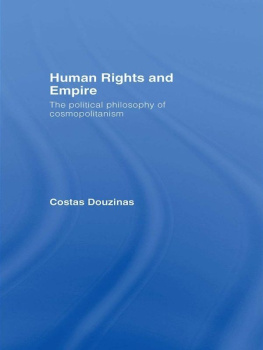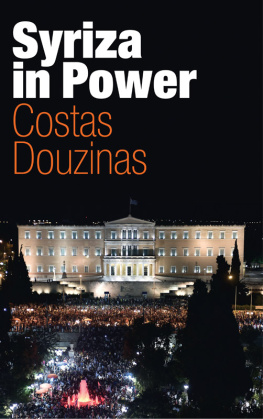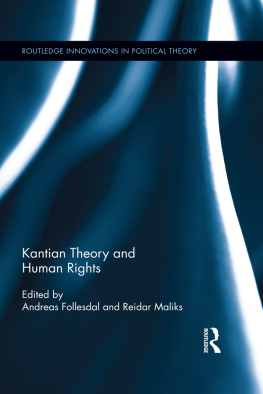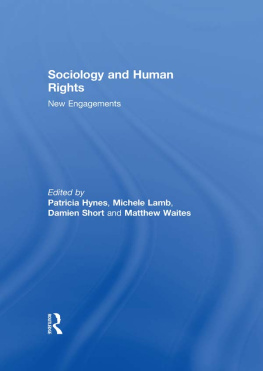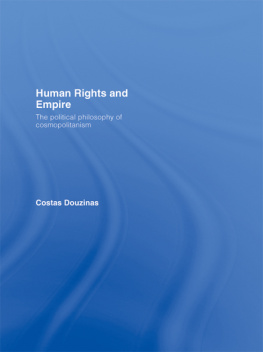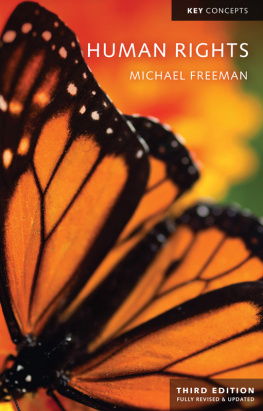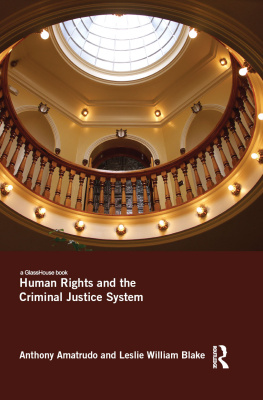Human Rights and Empire
The political philosophy of cosmopolitanism
Is there an intrinsic relationship between human rights and the recent wars carried out in their name? Are human rights a barrier against domination and oppression, or the ideological gloss of an emerging empire? In its examination of the normative characteristics, political philosophy and metaphysical foundations of our age, Human Rights and Empire addresses the paradox of a contemporary humanitarianism that has abandoned politics in favour of combating evil.
Human rights continue to offer a defence against power. But as Costas Douzinas argues in the first part of this book, the Westerner is placed in the role of saviour of the victims of violence and human rights have come to operate in a divided world. The ideal, universal, position of human rights has thus been reversed. In their capacity to contribute to the creation of human identities, human rights have become a means for regulating human life, and so have become tools of public power and the expression of individual desires. The second part of the book pursues this argument in the context of recent international events, and considers how human rights have come to provide the justification for a new configuration of political, economic and military power. Cosmopolitanism is the formal ideology of the new order; the removal of violence and perpetual peace its alleged end. But insofar as wars, violence and torture are its modus operandi, human rights now codify and constitutionalise the normative sources of empire.
While the sovereignty of states and the territorial principle have been weakened, no sense of world community has developed. But, Douzinas concludes, it is precisely the renewal of an ancient cosmopolitanism that may give rise to a new politics of community.
Costas Douzinas is Professor of Law and Dean of the Faculty of Arts and Humanities at Birkbeck College, University of London. His many books include Adieu Derrida, Critical Jurisprudence, Law and Aesthetics, The End of Human Rights and Justice Miscarried. He is Managing Editor of Law and Critique: The International Journal of Critical Legal Thought.
The political philosophy of cosmopolitanism
First published 2007
by Routledge-Cavendish
2 Park Square, Milton Park, Abingdon, OX14 4RN, UK
Simultaneously published in the USA and Canada
by Routledge-Cavendish
270 Madison Avenue, New York, NY 10016
A Glasshouse book
Routledge-Cavendish is an imprint of the Taylor & Francis Group, an informa business
This edition published in the Taylor & Francis e-Library, 2007.
To purchase your own copy of this or any of Taylor & Francis or Routledges collection of thousands of eBooks please go to www.eBookstore.tandf.co.uk.
2007 Costas Douzinas
All rights reserved. No part of this book may be reprinted or reproduced or utilised in any form or by any electronic, mechanical, or other means, now known or hereafter invented, including photocopying and recording, or in any information storage or retrieval system, without permission in writing from the publishers.
British Library Cataloguing in Publication Data
A catalogue record for this book is available from the British Library
Library of Congress Cataloging in Publication Data
Douzinas, Costas, 1951
Human rights and empire: the political philosophy of cosmopolitanism/Costas Douzinas.
p. cm.
1. Human rights.2. Cosmopolitanism.I. Title
JC571.D775 2007
323.01 dc22
2006033830
ISBN 0-203-96286-9 Master e-book ISBN
ISBN 10: 0415427584 (hbk)
ISBN 10: 0415427592 (pbk)
ISBN 13: 9780415427586 (hbk)
ISBN 13: 9780415427593 (pbk)
Prologue
How can intellectuals resist the onslaught of wars, violence, religious terrorism, torture, the central characteristics of the early twenty-first century? Can theory or philosophy help us understand the sense of the world and develop a politics of dissent? What is the function of the academic in a culture where according to President Bush whoever is not with us is against us? What is the role of critique in an environment where scholarship is judged according to managerial criteria that reward the safe, the conventional, often the banal? These questions have persistently followed and tormented critical thought in the last twenty years. I have no simple or right answers. Like many others, however, I believe that this is the time for intellectuals and academics to join the wider political and cultural debates and conflicts and bring whatever limited insights disciplinary knowledge offers to the task of imagining and working for a better world. Too often we academics have opted for a life of accommodation and non-confrontation, looking to the next promotion or book contract. Too often has the university slavishly served the demands of state, nation, ideology. And yet, the prime mission of the university remains the quest for knowledge and truth. As we know since Socrates, knowledge and truth are the inseparable partners of justice and beauty. Truth and knowledge are wedded to justice; speaking truth with justice to power is the name and honour of the European university.
Let me recount the strange story of the creation of the first European university in Bologna. Between the eleventh and twelfth centuries, the War of Investitures dominated Europe. Frederick I, the Emperor Barbarossa,
ambitious to restore the splendour of the purple, invaded the republics of Lombardy with the arts of a statesman, the valour of a soldier and the cruelty of a tyrant. The recent discovery of Roman law, had renewed the science most favourable to despotism. And the Doctors of law of Bologna proclaimed the emperor the absolute master of the lives and properties of his subjects.
This is how Gibbon described Barbarossas attack on the Italian cities. The reassertion of the Holy Roman Empire was a defining moment in the development of modern Europe, in the relationship between church and state and in the creation of the European University. In 1158, four eminent professors and Doctors of law, Bulgaro, Martino, Jacopo and Ugo di Porta Ravegnana members of a School established in Bologna by the great glossator Irnerius were invited by the Emperor to appear at the Diet of Roncaglia. They were asked to advise on the relationship between imperial law and local legal customs and political institutions, particularly those of the powerful Lombard cities. The cooperation was beneficial for both parties. The jurists, trained in the imperialism of the Justinian code, drew up a list of regalia or regulations, favouring the emperor against local claims with one dissenting voice, that of Martino. They demonstrated, with detailed commentary, that Roman Law was supreme and that its authority rested with the empire not the cities.
The emperors gain was legal recognition. The reward for the jurists was an Authentica Habita, a decree or charter later accepted as the foundation act of Bologna, the oldest university in Europe. This imperial grant of privilege had three elements. Each scholar could choose to recognise the jurisdiction of his professor in all matters affecting him. Second, the charter granted everyone who travelled for the sake of study imperial protection on their way and during their stay at the place of learning, a privilege later extended to the students return journey. Exemption from all tolls, duties and customs was also given to students and their servants (this is the beginning of the duty free concession. As it is being phased out, academics should claim that they have historical claim to it). Finally, the decree prohibited the use of reprisals against students, a common and strongly resented practice, under which if an English student, for example, left Bologna without paying his debts, the Bolognesi could recoup their money from other English students. This was a key moment in European academic history. Bologna started as a law school but developed out of the liberal arts, which flourished early in the eleventh century. Grammar, rhetoric and

